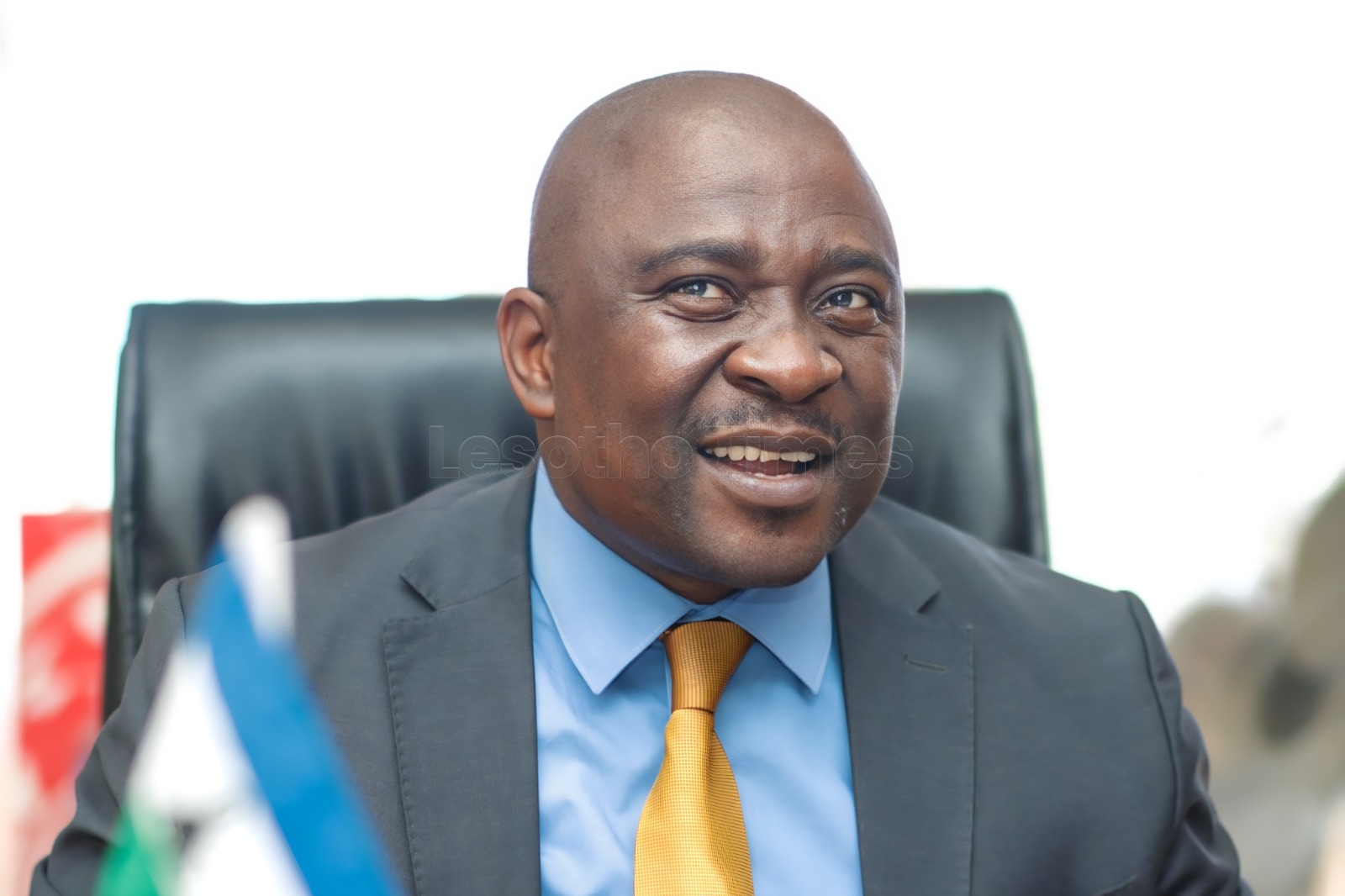Copyright lestimes

—vehemently rejects allegations that 109 patients have died due to negligence Mohloai Mpesi/Mathatisi Sebusi MINISTER of Health, Selibe Mochoboroane, has dismissed allegations of corruption and mismanagement at the newly established Maseru District Hospital. The damning allegations were made last week by ophthalmologist Dr Wenjun Fan (PhD), who heads the institution’s Eye Department. Dr Fan, who has since been suspended (see story on 4), had painted a bleak picture of a hospital in crisis where medical protocols and procedures are routinely flouted and patient safety is routinely endangered. But Mr Mochoboroane has dismissed the allegations as a case of sour grapes after Dr Fan failed to secure the senior position of Director-General of Health Services which the minister claimed the ophthalmologist had been canvassing for. The 200-bed modern hospital was funded through a CNY400 million (nearly M1 billion) donation from the Chinese government, with Shanghai Construction Company beginning work in April 2021 and completing the facility in April 2024. Designed to provide high-quality services, the hospital includes ophthalmology, intensive care, dialysis, CT scan, and infectious disease departments, among others. It had been expected that the hospital would significantly contribute to resolving Lesotho’s health infrastructure challenges. Mr Mochoboroane sat down with Lesotho Times (LT)’s senior journalists to address the issues raised by Dr Fan and to set the record straight about alleged mismanagement at the new hospital. LT: There are serious claims of mismanagement that have been made by one of the senior doctors at Maseru District Hospital (Dr Fan). He claims that the hospital’s management operates as it pleases, disregarding laws, and that about 109 patients have died due to doctors’ negligence, including wrong medication and misdiagnoses. What is your response to these very serious allegations? Mochoboroane: There is no mismanagement at the Maseru District Hospital. The problem is with one doctor who I found speaking disparagingly about the incumbent Director-General when I assumed the position of minister. The same person later approached his senior colleagues expressing interest in that position, so he is the one creating chaos. Regarding the 109 deaths, the timeline is not clear. The hospital opened for outpatients around June or July 2024, but the wards only opened in January 2025. Even if you check the records, you won’t find evidence of such claims. LT: Dr Fan has alleged that doctors and nurses keep manual records yet there are computers in all departments? Mochoboroane: That’s correct. The hospital’s proper digital system has not yet been installed, so records have to be kept manually for now. LT: There are allegations that the Death Review Committee is not meeting as it should. Are patient deaths being reviewed to determine the causes, including negligence or critical conditions? Mochoboroane: I chair the management meetings here at the (Ministry of Health) headquarters every Monday morning at 7am. On Tuesdays, Maseru District Hospital holds its management meetings to ensure that any issues affecting the hospital that would have been discussed on Monday are attended to. I follow up to ensure that after our meetings they conduct theirs at the hospital. If Dr (‘Mabatho) Masupha (Medical Superintendent) fails to attend, then Dr (Maama) Mojela will attend so there is never a time when the meetings are not held. LT: Allegations have also surfaced that hospital funds are diverted from maintaining critical equipment. For example, Dr Fan claims that a broken microscope lens has not been replaced for over a year, forcing critical eye patients to be referred to South Africa. Mochoboroane: Resources are never diverted to purposes unrelated to the hospital. Dr Fan is pushing his own agenda, and I do not agree with his allegations. I cannot dispute that some equipment could be lacking because a hospital that has only been open for a year cannot have everything at once. It is not normal for someone to wake up and start criticising the hospital without a hidden agenda. This doctor has a hidden agenda. The problem does not lie with the hospital; he is the problem. He wants to attain higher positions in an inappropriate way by tainting the name of the hospital, which is bad behaviour. For example, the position of Director-General has been advertised; he should apply like anyone else instead of criticising his seniors because he wants a position at all costs. LT: If he is lying as you say, has any action been taken against Dr Fan? Mochoboroane: Administratively, he has been reprimanded several times. Currently, he has been issued with a suspension letter, and the matter is being taken seriously. Since I arrived, he has been reprimanded several times, so the only remaining step is to take serious measures. Perhaps that is exactly what he wants. LT: There are allegations that management staff hijack training opportunities meant to upgrade skills for junior staff in China. When they return, they reportedly do not provide reports or teach others, leaving machines idle because nurses manning them do not know how to operate them. Mochoboroane: It is not true that only management goes for training. We currently have 40 nurses in China on training courses. Perhaps that person is referring to the case of Dr Masupha attending management training. However, there are other training programmes for lower-level staff which nurses attend in China. LT: There seems to be a shortage of staff at the hospital. One of our journalists said she arrived at 7am but was only attended to around 5pm. The ministry’s spokesperson said doctors start at the wards and only attend to outpatients after lunch. The doctor reportedly only starts seeing outpatients at 2.15pm. Mochoboroane: I cannot deny that. I also visit the hospital regularly and notice long queues that extend until around 5pm. The reason is that after the hospital opened, patients stopped going to clinics first as they should. Even for issues that require clinical services, patients come directly to the hospital, yet the hospital is intended for referrals from clinics. That inevitably causes long queues. When patients do not start at the clinics, the number of visitors at the hospital increases. Even if we had many doctors, the high patient numbers would affect service speed. We have clinics in Qoaling, Likotsi, and Mabote, where patients should start. LT: The government terminated its partnership with the Tšepong Consortium supposedly to cut costs. But now we see a new partnership with Tsebo Health Solutions. What does the latter bring which is different to the previous arrangement with Tšepong? Mochoboroane: If you look at the budget I presented this financial year, I listed the Ministry of Health’s priorities, which are: strengthening primary healthcare, strengthening the referral system, and establishing a medical school. The hospital was built with a public wing accommodating more than 500 beds and a private wing with 34 beds. Until now, the private wing has remained idle, despite its potential. The intention is that the public wing will be run publicly, while the private wing will be privately run. When I arrived at the ministry, there was no referral policy, so we established one. Previously, hospitals such as Queen II, Sankatana, and QMMH were all independently referring patients to South Africa. This is in addition to self-referrals where individuals would just walk into a facility in South Africa and claim they are from Lesotho. In the end the Lesotho government was billed in all these cases. We have managed to improve the system, now QMMH is the primary referral entity, thereby reducing referral costs. The difference between Tŝepong and Tsebo Health Solutions, which partnered with Busamed Hospital, is that Tŝepong ran the whole facility, whereas now the government will continue to run QMMH. Operations at the new private wing will not affect the public wing. The advantage is that, since the government cannot attract specialists and super-specialists easily, Tsebo will allow us to tap into the expertise of doctors from Busamed Hospital. We are also building a cancer centre because we believe it is embarrassing to refer cancer patients abroad. Our goal is to treat all patients within the country, reducing referrals to South Africa while retaining access to the best expertise. Opening a private wing with specialised doctors addresses the difficulty of attracting specialists, given the less competitive packages the government can offer. When comparing costs spent in South Africa against what would be spent in Lesotho after opening the private wing, the analysis shows substantial savings for the country. The arrangements with Tŝepong Consortium and Tsebo-Busamed are entirely different. LT: Who will pay for referrals to the private wing? Mochoboroane: The government will pay for referrals of patients who would have been sent from the public wing. However, patients entering the private wing voluntarily or on medical aid will foot their own bills. Many patients already travel to Bloemfontein on medical aid so we want those patients treated here. There is nothing embarrassing about providing care locally. We need a health system we can be proud of. When my time comes, I want to die in Lesotho, not elsewhere. To achieve this, I must build a system capable of treating patients locally instead of sending them to Bloemfontein. LT: Some doctors are reluctant to work for the government, especially in remote rural areas because of poor conditions. What are you doing to address that? Mochoboroane: That is true. We are developing a retention package policy and lobbying the ministries of Public Service and Finance and Development Planning to ensure doctors working in districts have better packages than those in Maseru. We aim to provide an attractive package for district doctors. For instance, we have a filter clinic at Katse, but we cannot get a doctor to work there because the package is unattractive, so we are working on this. We have increased the mountain allowance from M270 to M1000 a month. We believe there is wisdom in paying doctors well so that they can provide the best health services. A strong retention package is therefore crucial to ensure doctors work effectively across the country.



